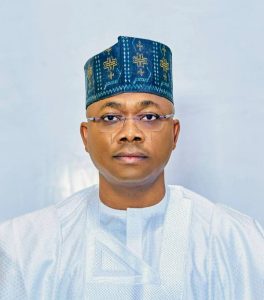

By Dada Ahmed.

Governor Ahmed Usman Ododo.
Kogi State, popularly referred to as the Confluence State, is a miniature Nigeria where diverse ethnic groups and cultures converge. Home to three major tribes,Igala, Ebira, and Okun (Yoruba),as well as other minority groups, Kogi embodies the richness of Nigeria’s cultural mosaic. This diversity, if properly harnessed, holds the potential to serve as a foundation for sustainable social, economic, and political development under the current administration of Governor Ahmed Usman Ododo.
The Igala people, who occupy the eastern flank of Kogi State, are renowned for their rich cultural heritage expressed through festivals such as the Idah Fishing Festival, their chieftaincy institution, and traditional dances. Their resilience and agricultural prowess in producing yams, rice, and cassava make them indispensable in boosting the state’s food security. Harnessing their agricultural potential can contribute to Ododo’s vision of strengthening Kogi’s economy through agribusiness.
The Ebira people, mainly located in the central part of the state, are known for their deep-rooted cultural traditions, particularly in weaving, music, and communal living. Their vibrant masquerade festivals, such as the Ekuechi, attract visitors from far and wide. Beyond culture, the Ebira land is endowed with solid minerals, including limestone and iron ore, critical to the industrial development of Kogi. With proper integration, the Ebira industrious spirit can serve as a catalyst for industrial growth in line with Ododo’s economic blueprint.
The Okun people, situated in the western part of the state, share cultural and linguistic ties with the Yoruba of the Southwest. They are known for their commitment to education, entrepreneurship, and hospitality. Their annual new yam festival and rich folklore underscore a deep sense of identity. The Okun area’s emphasis on education can help strengthen Kogi’s human capital development, an area crucial for empowering youths and supporting Ododo’s plans for inclusive governance.
These three major ethnic groups, along with other minorities such as Bassa, Nupe, and Oworo, reflect Kogi’s true strength in diversity. The challenge, however, has been transforming these cultural and historical differences into collective assets for growth. Unity in diversity becomes more than a slogan when citizens deliberately harness their distinct strengths for a common purpose.
Socially, the interplay of these cultures can foster inclusiveness and mutual respect among communities. When cultural festivals are promoted as state-wide events, they not only preserve heritage but also enhance tourism, generate revenue, and create jobs. By supporting inter-ethnic exchange programs, the Ododo administration can further deepen trust and reduce ethnic rivalries that often derail development.
Economically, Kogi’s diversity is a goldmine. The Igala farmlands, Ebira mineral resources, and Okun entrepreneurial skills present a tripod of opportunities. A collaborative framework where each region contributes its comparative advantage will accelerate the state’s development. For instance, agro-processing plants in Igala land, cement factories in Ebira land, and educational hubs in Okun land can complement one another to drive balanced economic growth.
Politically, unity among the ethnic groups is essential for stability. Kogi has often faced challenges of ethnic rivalry in elections, but a collective understanding that political power should translate into equitable development can foster cooperation. Governor Ododo’s administration has a unique opportunity to set the tone by ensuring continued fairness in appointments, projects, and policies, thereby cementing the trust of all groups.
The youth population across the three major ethnic groups also holds the key to building a united Kogi. By leveraging their creativity, technological skills, and entrepreneurial energy, Ododo can nurture a generation that sees beyond tribal divisions. A united youth front can drive innovation, create businesses, and serve as ambassadors of peace across the state.
Women too, play a pivotal role in knitting together the social fabric of the state. Igala women farmers, Ebira traders, and Okun professionals represent untapped potential. Empowering them through cooperative societies, microfinance, and skill acquisition programmes will not only strengthen families but also stabilize communities for sustainable development.
Religious harmony is another strength of Kogi State. With a mix of Muslims, Christians, and traditionalists living side by side, the state has shown resilience in managing religious diversity. The Ododo administration can build on this by encouraging interfaith dialogue and using religious leaders as agents of peace and community mobilization.
Harnessing diversity also means promoting inclusivity in governance. Appointing individuals from different ethnic backgrounds into key positions, and ensuring projects are evenly spread, will reassure all groups of belonging. Such inclusivity will transform Kogi’s diversity from a source of tension into a pillar of strength.
At the heart of this vision lies the principle of equity. Citizens must embrace the reality that unity in diversity is not about erasing differences, but about celebrating and channeling them into productive ventures. By appreciating one another’s traditions and values, Kogi people can create a shared identity that transcends tribe.
As the Ododo administration unfolds its various policies and prigramnes, the responsibility does not lie with government alone. Citizens too must take ownership of unity by discouraging ethnic prejudice, supporting one another’s businesses, and celebrating collective achievements. Development is best achieved when the people, not just the government, commit to building together.
In a nutshell,it must be emphasised that Kogi State’s diversity is not a burden but a blessing. The Igala, Ebira, and Okun, along with other groups, possess cultural and economic treasures that, if harnessed in unity, can transform the state into a model of progress. For Governor Ahmed Usman Ododo, nurturing this unity in diversity is the surest path to achieving his vision of social cohesion, economic prosperity, and political stability for Kogi State.
Ahmed,a former Head of the News Agency of Nigeria,NAN, in Kogi State,is the publisher of The Reporters.

